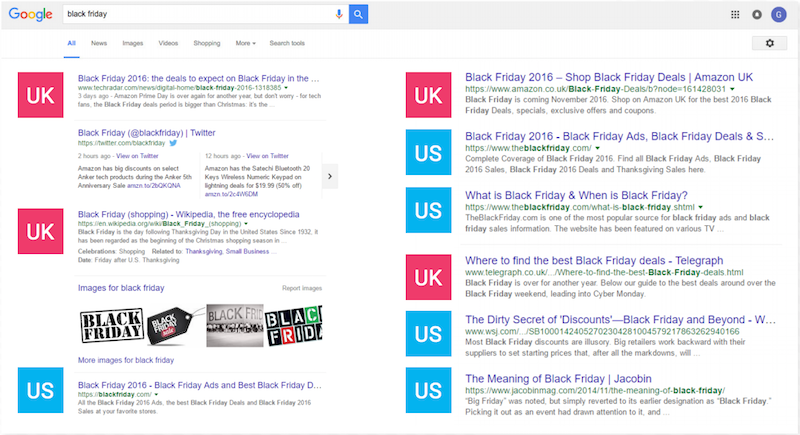Here’s a closer look at the opportunity it presents, as well as how retailers can best capture consumer interest through organic search.
What happened last year?
Despite murmurings that consumers are becoming fed up of Black Friday madness – and some retailers like Rei even taking a stance against it – last year’s figures speak for themselves.
While online searches in the UK were down, overall sales during the Black Friday period increased by an impressive 62%.
Likewise, overall sales in the US increased by 14.3%, and ecommerce sales are predicted to grow by 17% this year.
So, we can certainly see that Black Friday still presents a mammoth opportunity for retailers – the key is knowing how to seize it.
Identifying opportunities for organic search
The below chart, taken from a Black Friday report by PI Datametrics, highlights the most valuable search terms from November 2015.
While ‘Black Friday’ has the biggest search volume, it is only the fourth most valuable in the list in terms of ‘Organic Value’.
Organic value is a benchmark created by Pi Datametrics. It’s worked out as ‘search volume X CPC X PPC competition’ of a search term or group of search terms
On the other hand, we can see phrases that include the word ‘deals’ have greater potential for conversion, proving that it is worth optimising keywords based on this trend.
In fact, November is now the primary month for searches around ‘deals’, even overtaking words like ‘cheap’ when used in conjunction with products.
A missed opportunity for the UK
Interestingly, PI Datametrics has reported how US brands are dominating UK search results, showing how UK retailers are failing to optimise as well as their American counterparts.
For the term ‘Black Friday’, five out of the top 10 sites in Google UK are US-based, with Target appearing for a variety of terms including ‘best black Friday deals’ and ‘black Friday bargains’.

Again, this points to a need for greater optimisation, with many UK retailers failing to research crucial trends and keywords to give themselves an edge.
Meanwhile, US brands also appear to be making the most of data to re-target bargain-hungry consumers all year round.
The best UK perfomers
So, which brands are performing the best in terms of visibility in the UK?
Undoubtedly, Argos is head and shoulders above the rest, with a 53% share of the most valuable search terms across positions 1 to 10.
Likewise, it is also a consistent performer, ranking on page one for the term ‘Black Friday Deals’ all year round as opposed to during seasonal times only.
One of the main reasons for this is that it has a well-optimised long-term landing page, enabling it to capitalise on search interest before and after the event.
Moreover, this also allows it to build authority and consumer trust over time.
Here’s a closer look at Argos, as well as a few other examples of good (and mediocre) landing pages.
Argos
With its long-term page, Argos is a great example of how to optimise for a seasonal event.
As well as a prominent header, it also includes the repetiton of keywords combined with natural copy and useful information based around the event.
Debenhams
Debenhams is another good example, capitalising on interest in this year’s event as early as possible.
While it’s not the most attractive, it includes repetition of the core phrase, as well as keywords relating to Cyber Monday and Christmas.
Amazon
Amazon’s landing page aims to take advantage of the user’s interest in Black Friday by promoting current deals and discounts.
It’s a fairly dull page compared to the others on this list, but it includes similar information about why Black Friday and Cyber Monday exist.
Very
Very’s landing page has a great design, and includes a few impressive stats from 2015. Will consumers find this data particularly interesting though?
It could perhaps do with a more prominent mention of Black Friday 2016 to reassure customers that more deals are just round the corner.
John Lewis
Finally, John Lewis raises the question of whether Black Friday should be based around big ticket items only.
It is a well-optimised page, including informative content and regular mentions of Black Friday search terms.
However, the URL comes under the ‘electricals’ category, meaning it shuts out interest relating to clothing and homeware.
John Lewis traditionally puts a big focus on Christmas retail, and its festive TV ads are always much-anticipated.
Equally slashing prices wouldn’t really fit with its brand image, so it could be that the retailer prefers to take a low key approach to Black Friday.
Key points
Brands that want to make the most of the organic search opportunity in the lead up to Black Friday should follow a few simple rules:
- Create an ever-green landing page and keep it updated.
- Focus on a variation of keywords including ‘deals’ and ‘bargains’ to capture year-round interest.
- Black Friday isn’t prime time for every retailer – consider whether it is worth investing more in other seasonal events like Christmas or Halloween.
To learn more on this topic, check out Econsultancy’s range of search marketing training courses.









Comments